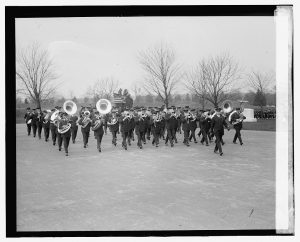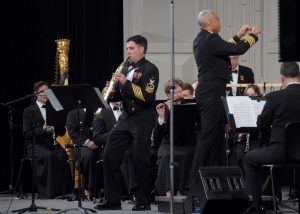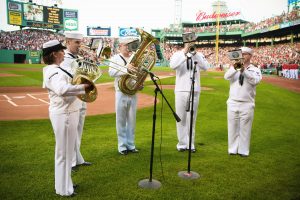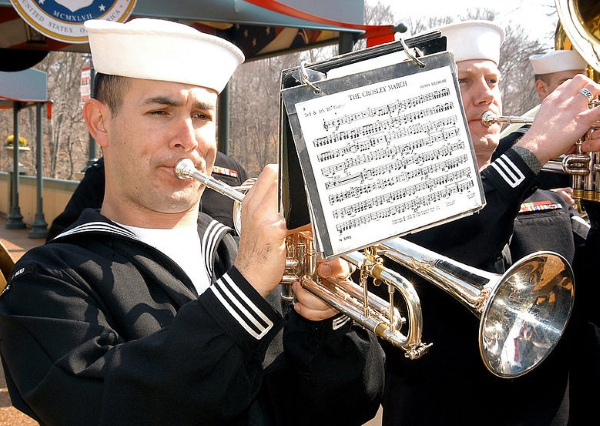Life as a musician would be awesome, right?
Just think of it – concerts all over the world, live TV and radio appearances, international parades, Presidential Inaugurations, performing for foreign dignitaries – what’s not to love?
Alas, the sad truth is that musicians sometimes struggle, all too often ‘poster children’ for the starving artist stereotype.
Not all musicians, of course.
Certainly not Navy Musicians.
That’s right. The Navy has a rate specifically for musicians, Navy Musician (MU), who wish to serve their country, gain valuable experience as a musician, perform for audiences the world over, and want a steady paycheck with benefits.
In regions where we often don’t understand the native language of our allies and hosts, Navy Musicians bridge that gap through the universal language of music.
They serve as United States and US Navy ambassadors to nations the world over.
Musicians in the US Navy are almost as old as the Navy itself.

The Naval Act of 1794, often referred to as the “Act to Provide a Naval Armament,” informally established the Navy Musician rate in the United States Navy.
The act specifically requested one Fife and one Drum player for each of the early US Navy’s original six frigates.
In 1838, the Navy officially established the MU rate for Navy Musicians.
Related Article – Navy Jobs List: A List Of All 71 Ratings In The Navy
Jump To A Section
Training and Career Path
Pay and Benefits
What’s Life Like as a Navy Musician?
Civilian Career Opportunities
A far cry from the original dozen Navy musicians on the six frigates, there are now approximately 600 MUs serving in today’s Navy.
https://www.youtube.com/watch?v=vCcNwku60QI
Requirements and Qualifications
To become a Navy Musician, there are specific requirements and qualifications that you must meet:
- Must be a member of the US Navy.
- Must be a US citizen.
- No security clearance is required.
- Must be between the ages of 18 and 39.
- Must have no record of adversely adjudicated drug abuse offenses.
- Must meet and adhere to strict appearance requirements.
- Must pass an official audition (more on that below).
- Although no line score is required on the Armed Forces Vocational Aptitude Battery (ASVAB) test as with other rates, a minimum score of 31QT is needed. This is the minimum Armed Forces Qualification (AFQT) score required for all members enlisting into the US Armed Forces.
Related Article: Navy Height And Weight Standards
Navy Musician Performance Audition
While individuals can go through their local Navy Recruiter, many applicants opt to contact audition supervisors directly, as it may be far more comfortable speaking to a fellow musician.
Applicants are screened for eligibility prior to scheduling a live audition.
Once both the applicant and the audition coordinator believe that the MU applicant is a good fit, an audition is set up at the nearest Navy Fleet Band.

Auditions are performed on-site and are live, in-person.
All MU specialties must audition:
- Flutist/Piccoloist
- Trumpeter
- Guitarist
- Oboist
- Hornist (French Horn)
- Percussionist
- Clarinetist
- Euphoniumist
- Keyboardist
- Bassoonist
- Trombonist
- Electric Bassist
- Saxophonist
- Tuba Player
- Vocalist/Entertainer
Each specialty has its own specific audition requirements, although rhythm players and entertainers/vocalists have more specific requirements due to the specifics of the job requirements.
Most specialties require sight-reading, and a number of prepared solos in a variety of music genres such as Funk/R&B/Soul, Jazz, Rock/Alternative, Country/Bluegrass, Patriotic, etc.
Audition requirements specific to each instrument can be found on the job opportunities page of the Navy music webpage (referenced below). Auditions generally require a prepared solo from the instrument’s standard repertoire, scales, and sight-reading excerpts.
Training and Career Path
Navy Musicians, like all Navy enlisted personnel, must first become a US Navy Sailor.
Recruits accomplish this via successful completion of Navy Recruit Training, commonly referred to as Boot Camp.
All sailors attend Boot Camp at the Recruit Training Command, Great Lakes (RTC Great Lakes).
Located at Naval Station Great Lakes in North Chicago, Illinois in Lake County. RTC Great Lakes is commonly referred to as “The Quarterdeck of the Navy.”
Boot Camp is eight weeks long. During these eight weeks, the Navy teaches all future seaman, airman, and fireman the basic skills required of all US Sailors.
Related Article – Is Navy Boot Camp Hard?
Navy Musician Class “A” School
After Boot Camp, Navy Musicians travel to Little Creek, Virginia where they have 21 weeks of training at the Armed Forces School of Music, commonly known as the Navy Musician A School.

The initial few weeks of the course focus on instrumental performance, ear training, and the fundamentals of music theory.
The entire duration of the course includes training on:
- Ear Training
- Music Theory
- Jazz Ensemble
- Concert Band
- Drill Band
- Improvisation
- Contemporary Music Ensemble
- Private Instrument Instruction
- Musical Instrument Digital Interface (MIDI) (Keyboard and guitar students only)
The music student’s average school day includes academics, marching drills, a variety of ensemble performances.
A minimum of 15 hours of individual practice weekly is required.
Additionally, progress is closely monitored throughout the training with multiple auditions required along the way.
In addition, The Navy provides additional online training to Navy MUs through their Credentialing Opportunities On-Line website, referred to as Navy COOL.
Additional training is available to Navy Musicians as their Navy career progresses, such as the Navy Musician “C” Schools, Unit Leader Course (E5-E6) and the Senior Musician Course (E6-E7).
Both courses are at Little Creek, Virginia, as well.
Sound Reinforcement Technician is another MU “C” School provided at the Naval School of Music.
How Much Are Navy Musicians Paid?
Like all other enlisted personnel (in all branches), the Navy bases a sailor’s pay on their rank and length of service.
MUs are no exception.
Navy Musicians may be entitled to other forms of compensation including base allowance for housing (BAH), base allowance for subsistence (BAS), and billet pay (sea pay, hazardous duty pay, etc.) if eligible.
Related Article: Navy Ranks And Pay For 2019
The Navy ensures that all MUs have a professional-quality musical instrument required for their specialty.
What’s Life Like as a Navy Musician?
After successfully completing both Boot Camp and Navy Musician “A” School, MUs are assigned to one of nine Fleet Bands, six of which are in the continental US and three outside of the lower 48 states.
The Nine Navy Fleet Bands are:
- Navy Band Northwest – Naval Base Kitsap, Washingon
- Navy Band Southwest – Naval Base San Diego, California
- United States Navy Band Great Lakes – Naval Station Great Lakes, Illinois
- Navy Band Northeast – Naval Station Newport, Rhode Island
- US Fleet Force Band – Naval Station Norfolk, Virginia
- Navy Band Southeast – Naval Air Station, Jacksonville, Florida
- Pacific Fleet Band – Joint Base Peal Harbor-Hickman, Hawaii
- US Naval Forces Europe Band – Naval Support Activity Naples, Italy
- Seventh Fleet Band – US Fleet Activities Yokosuka, Japan
After serving a tour in one of the Fleet Bands, Navy Musicians are eligible to serve in either of the Preferentially Staffed Bands:
- United States Navy Band – Washington Navy Yard, Washington, D.C.
- Naval Academy Band – US Naval Academy, Annapolis, Maryland
Additional potential duty spots include two Navy Band Support duty stations:
- Navy School of Music – Joint Expeditionary Base Little-Creek Fort Story, Virginia Beach, Virginia
- Fleet Band Activities/Fleet Support Unity – Naval Support Activity Mid South, Millington, Tennessee.
As a Navy Musician, you are held to an exceptionally high standard of musical excellence, personal conduct, exemplary behavior, physical fitness, and a high standard of personal appearance.
You are, after all, a part of one of the top music programs in the world.

As stated in the cool.navy.mil MU Rating Information Card:
“As a member of a Navy Band, your performances might include presidential inaugurations; parades down Main Street USA, or the Avenue des Champs Elysees in Paris; military ceremonies on the White House lawn or aboard carriers at sea; public shows and concerts as well as live radio and television broadcasts.”
It’s doubtful that life as a Navy Musician will ever be boring, or the MU will ever be idle.
Not only will you participate in parades, concerts, community events, and enjoy a great many travel opportunities, you will perform in a variety of musical genres sure to both challenge you, but afford you opportunities and experience that civilian life never will.
Typical Rotation
Sea/Shore Rotation is not a requirement for Navy Musicians. It is highly unlikely that an MU will spend any time at sea.
Frequent travel and TDY (Temporary Duty) should be expected, however.
Over a 20-year career, chances are that an MU will spend at least one tour in one of the three Navy Fleet Bands outside of the Continental United States.
Here are a few reviews featured on indeed.com from ex- and current Navy Musicians:




Navy MUs enjoy the same benefits as do all Navy personnel, such as the opportunity to travel the world, unlimited opportunities for learning and advancement, and control over their career.
The Navy MU rate is currently a High-Demand Rate in the Navy and advancement opportunities are good.
Civilian Career Opportunities
Civilian career opportunities for Navy Musicians include musician (of course), sound engineering technician, music composer/arranger, music director, music therapist, musical instrument repairer, and tuner, and art, drama, and music teacher, among others.
All sailors, Navy Musicians included, should take full advantage of on-the-job (OJT), extra training opportunities, and educational opportunities offered and afforded them during their naval service.
Related Article – Dishonorable Discharge: Reasons, Consequences, And More
The Music Teachers National Association (MTNA) has a certification program for Navy Musicians, the Nationally Certified Teacher of Music (NCTM).
State Licensure opportunities for MUs include:
- Art, Drama, and Music Teachers (Postsecondary)
- Elementary School Teachers (Except Special Education)
- Middle School Teachers (Except Special and Career/Technical Education)
- Secondary School Teachers (Except Special and Career/Technical Education)
- Sound Engineering Technicians
- All Other Teachers and Instructors
The United States Military Apprenticeship Program (USMAP) also allows MUs to complete civilian apprenticeship requirements while on active duty.
According to cool.navy.mil, these apprenticeships include:
- Computer Operator
- Correction Officer (Government Service)
- Counselor (Professional & Kindred)
If you are a talented musician, considering the US Navy as a career, able to successfully pass the Navy’s stringent audition process, and wish to represent the United States and US Navy to the world, well then, break a leg!
You can reach out directly to your local Navy Recruiter, or contact the Navy Music Program Audition Coordinator directly via email (mill_navymusic@navy.mil) or by phone at 901-874-4316/800-962-1425.
That is if you have the chops for it.
References
Official Navy Page for Navy Musician
Indeed.com Navy Musician Reviews
Navy COOL Summary For Navy Musician (MU)
Navy Cool Rating Information Card for Navy Musician (MU)
- Gas Turbine Systems Technician (GSM and GSE): Career Details - June 18, 2024
- Interior Communications Electrician (IC): 2023 Career Details - June 18, 2024
- Religious Program Specialist (RP): 2023 Career Details - June 18, 2024

